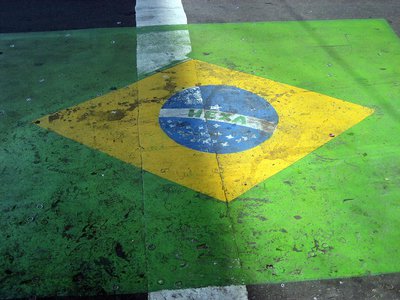
A Copa das surpresas (“the [World] Cup of surprises”) was a phrase I remember hearing several times during the first weeks of the 2014 World Cup. Holland had crushed the 2010 World Cup champion, Spain, 5-1. Germany beat Cristiano Ronaldo’s Portugal, 4-0. Costa Rica went undefeated in its first three games to become the leader of one of the most difficult groups of the cup. Top-ranked teams like Spain, Italy, Portugal and England didn’t even make it to the round of 16. The biggest surprise of all, however, would come later, in the semifinal between host nation Brazil and Germany. Like Brazil’s loss to Uruguay in the final match of the 1950 World Cup in Brazil, this 2014 semifinal will never be forgotten — nor forgiven — by the Brazilian people.
In 1950, Brazil appeared to be invincible by the time it reached the final match of its first World Cup on home soil. In its two previous matches, Brazil had beaten Sweden, 7-1, and Spain, 6-1. In its newly built Maracanã Stadium, with an estimated crowd of nearly 200,000 spectators, Brazil was leading 1-0 until Uruguay scored in the 66th minute. Uruguay scored a game-winning, crowd-silencing and ego-blowing second goal in the 79th minute.
The dramatic upset became known as the Maracanaço in Brazil and as the Maracanazo in Uruguay and almost everywhere else (-aćo and –azo are augmentative suffixes in Portuguese and Spanish, respectively, which may also denote a big blow). Brazilian anthropologist Roberto DaMatta has argued that the Maracanazo “is, perhaps, the greatest tragedy in the contemporary history of Brazil.” The national tragedy of the Maracanazo, however, has now been supplemented — if not supplanted — by the Mineirazo: Brazil’s humiliating 7-1 loss to Germany in the 2014 World Cup semifinal in the Mineirão stadium of Belo Horizonte.
When the 2014 World Cup began, Germany and Brazil were ranked as the second- and third-best teams in the world by FIFA. Despite having lost its captain and central defender (Thiago Silva) to accumulated yellow cards as well as its star offensive player (Neymar) to a back injury, Brazil still expected to compete with, if not beat, Germany in the semifinal.
A German goal in the 11th minute disrupted but did not destroy Brazil’s confidence. Then, stunningly, Germany scored four goals between the 22nd and the 29th minute. Brazilian dreams of avenging the tragedy of its first World Cup on home soil quickly (within six minutes) transformed into a nightmare. In a sport that rarely sees four goals in an entire match (especially in a World Cup semifinal between two top soccer-playing nations), the occurrence was absolutely unbelievable.
The match ended 7-1, becoming Brazil’s worst defeat in World Cup history. Curiously, Brazil had more possession of the ball (52 to 48 percent) and more shots on goal (13 to 12). Nonetheless, the 7-1 defeat was described by everyone I spoke to and throughout the media as a massacre, a humiliation, a disgrace. The main newspaper in Manaus wrote the following morning that the score, “surely, will make every Brazilian now look at the 1950 team with tremendous pride.” That might be some consolation, if it were true, but I am doubtful that it is.